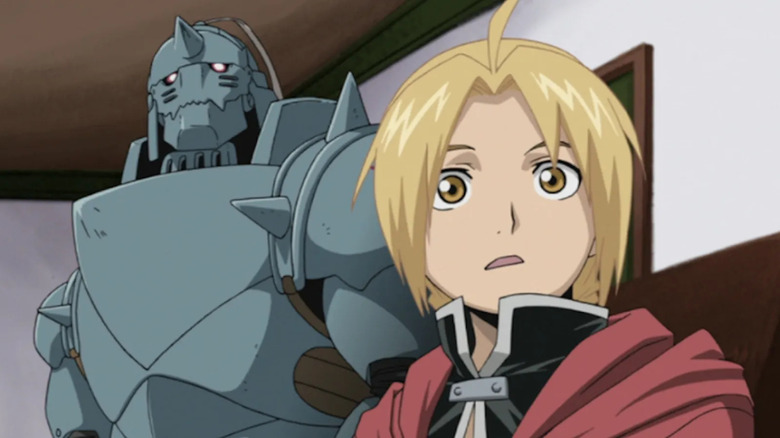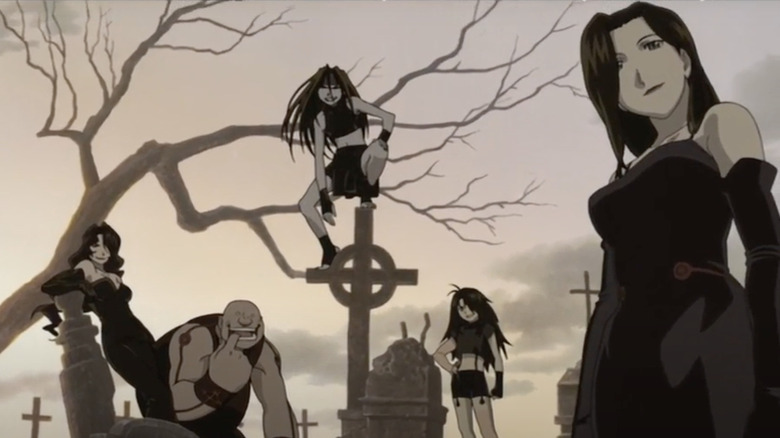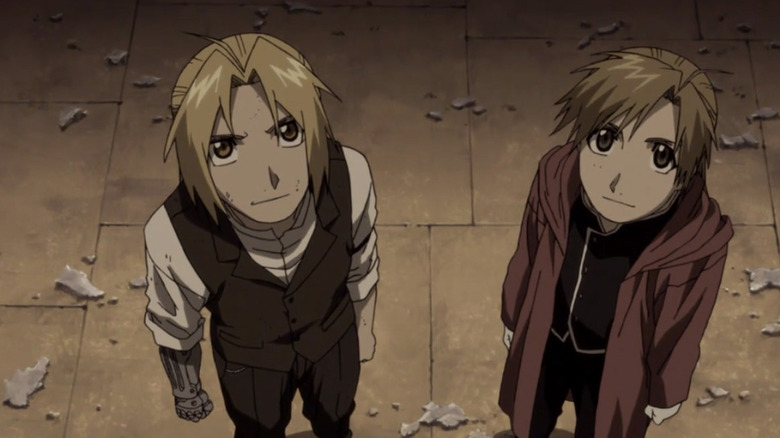20 Years Ago, The Original Fullmetal Alchemist Dared To Avoid A Happy Ending
Anime shonen is the bread and butter of anime and manga, with the most popular and recognizable titles all belonging to this demographic — and most of them to the battle shonen genre. Despite Michael B. Jordan's list of recommendations for the first anime you should watch all being shonen anime, they can be a bit too formulaic, and a problem for the industry at large. They all follow a boy hero who trains to become the best, makes friends along the way, and overcomes increasingly stronger enemies.
There's nothing wrong with this, of course, but it's the reason why many people (myself included) think the original 2003 "Fullmetal Alchemist" is a better show than its more manga-faithful remake, "Fullmetal Alchemist: Brotherhood." The two are drastically different adaptations of the very popular manga of the same name, even if they come from the same studio and share most of the same staff, and the same voice cast. While the second one adapted the whole manga as faithfully as possible, the original went into production in the early days of the manga and quickly ran out of material to adapt, so most of the story is comprised of original material.
But more than differences in plot, it is the difference in tone and theme that makes the two shows so similar — and fun to watch separately. A rather melancholic show overall, the original "Fullmetal Alchemist," which began airing 20 years ago, concluded with the bold decision to avoid a happy ending entirely and instead reinforce its themes of equivalent exchange.
'Man cannot obtain anything without paying a price'
"Fullmetal Alchemist" follows the story of Alphonse and Edward Elric and their attempts at restoring their bodies after an attempt at bringing their mother back to life using human transmutation. This resulted in Ed losing an arm and a leg, and Al losing his entire body (he got it replaced with a sweet suit of armor, though).
In the final episode, the brothers face off against their father's old flame, the leader of the Homunculi (monstrous creatures born from human transmutation), as well as their homunculus half-brother, which results in Ed briefly dying. In order to save him, Al sacrifices himself, doing a human transmutation to bring him back. Long story short, Ed does return and even gets his missing limbs back, but in the process, Al dies. Realizing what happened, Ed does another human transmutation, using his life in exchange for Al's. This follows the Law of Equivalent Exchange, which we've heard about since the very first episode: "Man must pay an equal price in order to obtain anything. That is the Law of Equivalent Exchange." Except, Ed doesn't die. Thanks to some magic-ish shenanigans, he lives, kind of.
Thanks to Ed's sacrifice, Al lives, but he is reverted to the age he was before the start of the series, with no memories of anything that's happened since before he and Ed performed human transmutation. As for Ed, he has his limbs back, but he is on the other side of the gate in our world ... Munich, Germany in 1923, to be exact. In both series, the brothers get what they wanted through a sacrifice, but where "Brotherhood" had the brothers happily celebrate their victory, 2003's "FMA" denied the brothers a happy ending and robbed them of what mattered most to them: their brotherhood.
Equivalent exchange
That's the crux of "Fullmetal Alchemist," which goes all the way back to the idea of the law of equivalent exchange that kickstarts the story — every action has a consequence, and every goal requires a sacrifice. The brothers' first attempt at human transmutation resulted not only in their missing limbs but in the creation of a monstrous homunculus. Every character in the show longs for something, makes sacrifices for it, and pays a price to get it (if they even do). That alchemy is fueled by energy released by death in our reality reinforces that law and the show's idea that prosperity usually comes from another's suffering. When Ed makes his sacrifice, he doesn't even know whether he succeeded, he just trusts that the law is true.
So the ending giving Ed and Al another big sacrifice — them being together — and giving them another thing to long for, perfectly matches the tone and the themes of "Fullmetal Alchemist." In the remake, the equivalent exchange was an idea to rebel against, an imperfect law that can be proven wrong. In the 2003 original show, the law is absolute, just not in the way the brothers initially think.
The finale ends with another piece of narration by Al, who (like he's done all series long) explains the law of equivalent exchange. Except things are different now. Al understands that the law can be interpreted differently. "Man cannot obtain anything without paying a price," he says. "By paying the price of effort, everyone will certainly be able to obtain something."
The message, then, is an optimistic, albeit bittersweet one. Life might treat you unfairly, and you might never get the thing you initially hoped for, but if you choose to persevere, you will gain a reward worth not giving up on.


